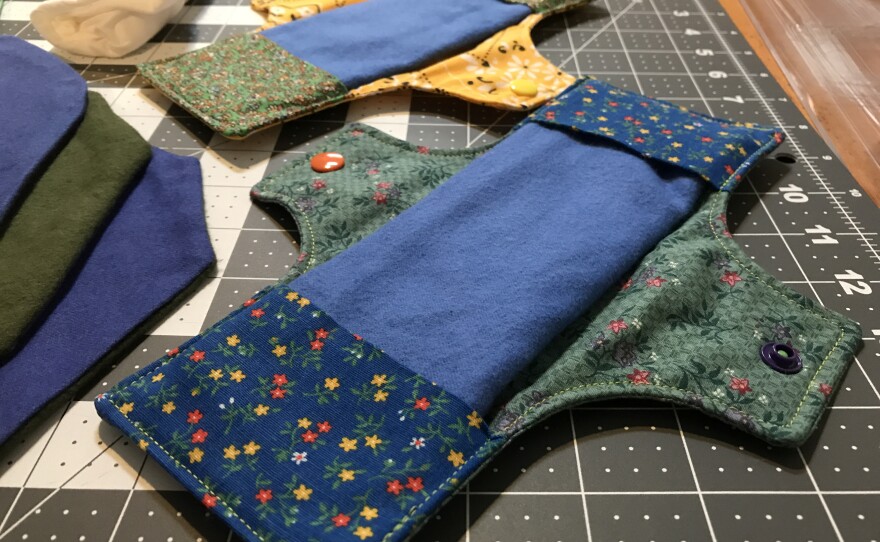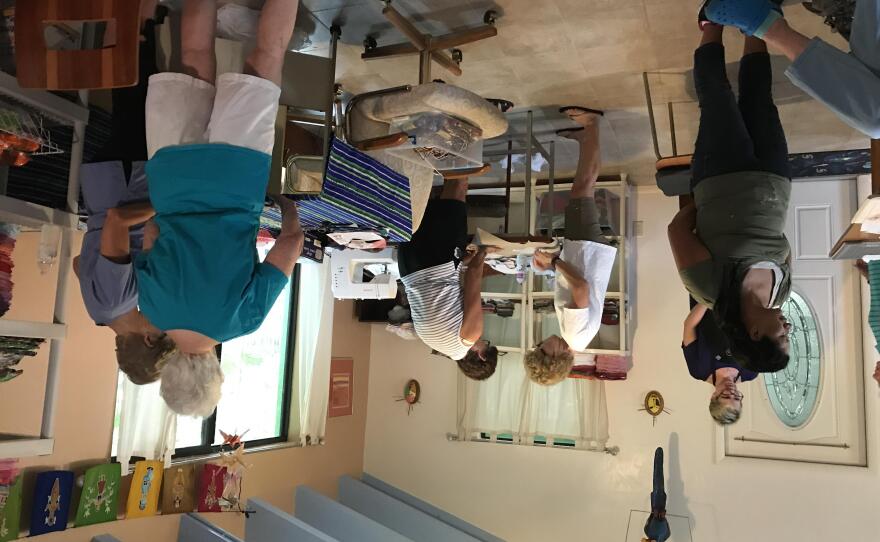A Southwest Florida group is making menstrual kits for women in Guatemala. Medical experts in the Central American country say women in rural areas there are sometimes isolated during their periods due to lack of sanitary pads and tampons. They can sometimes be too expensive. Some women can also get sick from overusing the little supplies they have. And there’s another problem: some villages are said to have zero sex education.
So, women in Fort Myers will distribute handmade, washable menstrual pads to women in rural areas of Guatemala, as part of larger sex education workshops. WGCU’s Jessica Meszaros will travel with the group to Guatemala in November. WGCU's John Davis spoke with Jessica about the trip.
JD: First of all, tell me more about this problem in Guatemala when it comes to a lack of sex education and menstrual pads/tampons...When it comes to the women living there, how does that impact their day-to-day lives?
JM: Medical experts tell me there is zero sex education in some rural parts of Guatemala. It’s just not a part of the conversation there. Women in most of these areas don’t even have underwear. So it’s unlikely that they’ll have pads or tampons to use during their menstrual cycle. They’re too expensive for some women. They use rags, instead, to capture their flow and they usually stay home for three to five days… or however long their periods last… because they’re worried their traditional skirts, called cortes, will get stained in public. Kirsten Austad is a physician, and the head of women's health for Maya Health Alliance in Guatemala. She says not only are these women isolated, they’re also getting sick from this rag practice. I spoke to her via Skype.
"We do very frequently encounter women who, because they don’t have enough rags to change it, have a lot of vaginal infections and vaginal irritation that causes a lot of distress and discomfort that if they did have the resources to change a pad more regularly they would prevent having those symptoms," said Austad.
JM: Austad says there’s a very big need for washable, reusable menstrual pads in rural Guatemala, like the ones being hand-sewn by women in Fort Myers.
JD: Tell me more about this local effort through the GRACE Project to provide menstrual kits for women in Guatemala. Who’s making them and what’s included in a menstrual kit?
JM: The GRACE Project is a group of local volunteers headed up by Genelle Grant. About 10 women meet a couple times a month in Fort Myers. They break out into different stations to create washable, reusable menstrual pads for women in the rural areas of Guatemala. And it’s not just the washable cloth pads—those are just part of a kit that includes things like soap to wash up and underwear so the women can have something to clip-on these pads. The kit also contains a beaded bracelet to help women keep track of their periods and the days they’re most fertile based on bead color.
JD: How many kits will the folks you’ll be traveling to Guatemala with in November be hoping to distribute?
JM: Yeah, I’ll be covering the exchange between the women of Fort Myers and the women of Guatemala during a nine-day trip out there. The GRACE project plans to distribute 300 of these hand-made kits. Genelle Grant just distributed 300 kits there in May. She says the women told her they’ve been wanting something like this. Here she is at her home in North Fort Myers hosting one of the menstrual kit meetups:
"When I talked with a 'curandero,' which is a healer, or a medicine woman, she cried and said she's been praying for something like this because every week women come to her with infections," said Grant.
JD: Is the creation and distribution of these menstrual kits a novel initiative, or is it modeled on any other ongoing efforts?
JM: The GRACE Project modeled its reusable pad design after one distributed in Guatemala by the international nonprofit Days For Girls.
JD: Besides distributing the menstrual kits, is there a public health education aspect when it comes to the goals of this trip in November?
JM: The two groups, GRACE Project and Days For Girls, are actually holding workshops to have an overall conversation about sex. Alba Barrientos of Days For Girls says people in the rural areas don’t talk about sex and menstruation at all. Barrientos is in the middle of opening up an official center for the nonprofit in Guatemala. Over Skype, she told me she hears stories like this one all the time:
"The parents bring one girl to the hospital and they were telling the doctor that she was bleeding every month and so they didn’t know what was going on that maybe she was sick so they realized it was her period. So what happened is that since there is no education the mothers will not know what the period is or it will be a conversation that they will never have with their kids because they do not talk about that," said Barrientos.
JM: She says she also hopes men will take part in the conversation too.
JD: Once your group leaves Guatemala after nine days, then what? Any plans for a lasting impact or a way to make this effort self-sustaining?
JM: So that Days For Girls center in Guatemala that Alba Barrientos is hoping to open in a few weeks—one of the goals for that facility is to teach Guatemalan women how to make these reusable pads themselves.
"So the purpose for us is just to be the main center and then be able to provide other small centers little small enterprises so maybe there is two women working and they only have a sewing machine so we can provide them the fabrics already cut out because they don’t have the cutting machine so we will provide them that and so they can actually just finish the kit and just by themselves they can go ahead and sell the kits," said Barrientos.
JM: She says she hopes to empower women by providing them with jobs and also creating these kits so women in Guatemala no longer have to be isolated or get sick during menstruation.
JD: Well, Jessica Meszaros, thanks for telling us about this initiative. And, of course, we look forward to hearing more about it when you return.
JM: Thank you so much. I'm really excited to learn and to tell these women's stories.





















